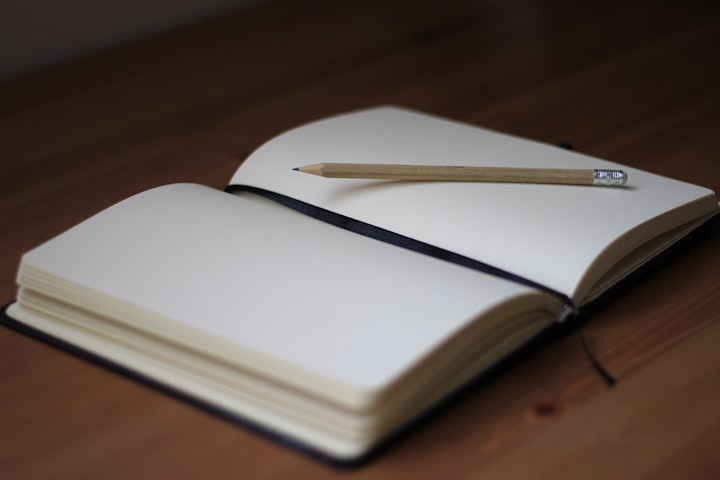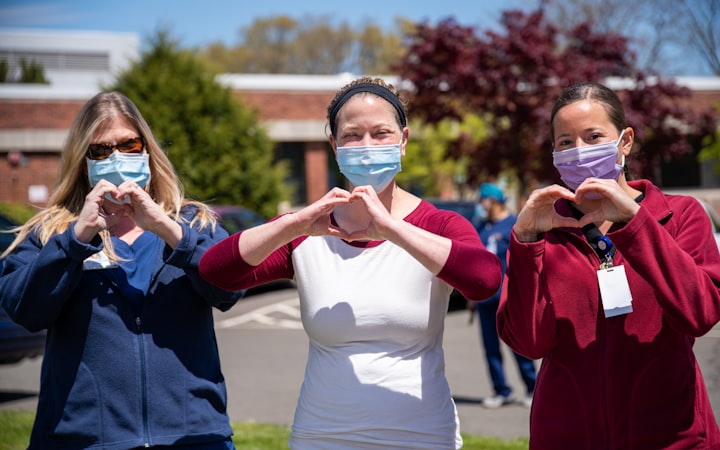The Book Will Do the Rest
A chance encounter on the bus leads to a little black book, with life-changing results

Mel hated taking the city bus.
Waiting in the cold, the awkward movement around other strangers crowded around a dirty shelter. That spike of anxiety as the bus pulled up, Mel always worried she wouldn’t have enough money on her card or that she wouldn’t find a seat. Or worst of all, the excitement of finding an empty row, only to have a stranger ask her to move her bag two stops later.
The entire experience left something to be desired, but unfortunately, the privacy of a car ride was reserved for those with steady paychecks, who could afford things like insurance and gas money. Cars were for those who could actually sell their art, Mel thought as the #24 groaned to a stop in front of her.
She gave a tight smile to the driver and said a silent prayer as she scanned her bus pass, relief filling her as the green light showed she had funds for the trip. Her luck run out with the seat, however; the downtown bus was packed full of people at this time of day, all attempting to maintain a little space, even as more people piled in the front.
Mel crowded near the back, grabbing a handrail and avoiding eye contact with her fellow passengers. She popped in her earphones to discourage anyone interested in making conversation on this dreary March day. They didn’t need to know that the headphones weren’t connected to anything except the lint in her jacket pocket.
She moved with the starts and stops of the bus; the crowd swaying slightly as it exchanged its passengers along the busy streets. The #24 started downtown, but made a turn on 22nd at the Youth Center, and was soon headed to the stadium district, the crowd emptying the farther away from the city center they got. Mel was keeping an eye out; the aisles had emptied, and single seats were appearing here and there. She preferred to wait until she had an entire row and kept her place at the pole near the door.
At Atlantic and Boulevard, a car cut in front of the bus after the stoplight and the driver slammed on his brakes, violently jostling the standing crowd. An older woman next to Mel lost her footing, fear in her eyes as her legs became tangled around one another, the shopping bags in her arms blocking her from grabbing a handrail. Mel dropped her own handhold, throwing her arms out to grab at the woman’s shoulders, herself stumbling with the force of it.
“Sorry everyone,” the bus driver crackled unconvincingly over the intercom.
“I’m so sorry, dear,” said the woman. Mel helped her to her feet, gathering the shopping bags and handing them to her as the stranger checked her possessions inside.
“It’s ok, are you alright?”
“Oh, I’m fine, thank you.” The woman offered a smile that Mel eagerly returned. Not a tight-lipped one this time either, but a real smile. The woman reminded her of her grandmother, who passed ten years ago this July. She wondered if this woman also made pancakes in the kitchen on Sundays.
The bus was mostly empty now, and Mel moved to take one of the free rows at the back. As she stepped, she felt a flapping at her shoe, glancing down to see that the sole had partially ripped free from the black leather, the stitches frayed and snapped on the side. It must have happened when she caught the old woman, the two stepping on each other in a bid to regain their feet.
“Shoot,” she muttered, taking a seat and examining the damage. This was her only pair of work shoes, and she knew her manager would give her an earful during her shift tonight. She couldn’t afford new shoes, but she also couldn’t afford to be fired; ever since she had stopped painting, her job as server was her only source of income. She poked a finger in the hole, tears welling up in her eyes. This just wasn’t her day.
Mel felt the force of someone’s gaze, the back of her neck telling her that someone was looking. She turned in her seat, and caught the stare of the old woman she had assisted, now sitting in the row across the aisle. The smile was gone, replaced by an intense look upon her face as she watched Mel investigate her shoe.
Assessing her. Watching her.
Mel gave her a half-hearted smile, gesturing to the shoe and shrugging her shoulders. She turned forward in her seat before she could see the woman’s response, the tears spilling over onto her cheeks. It wasn’t the woman’s fault, just the result of an old pair of shoes and a simple accident. Mel was hoping she could find some glue or tape at work; it wouldn’t be a permanent solution, but it would get her through a shift without the tell-tale flap, flap, flapping of the torn sole.
The bus pulled to a stop, and Mel felt a squeeze of her shoulder. It was the woman. She locked eyes with Mel for just a moment, then walked hurriedly down the steps of the bus and around the corner. The doors slammed shut, and as the bus pulled forward, an object caught Mel’s attention out of the corner of her eye.
A book lay on the seat the woman had previously occupied. Mel glanced up, but the woman was long gone, the bus already on its way to the next stop. Mel stepped across the aisle and picked it up. It was a small black book, a journal or diary from the looks of it. Mel flipped it open, hoping the woman’s contact info would be listed under the front cover of the Moleskine.
Instead, there was a brief, handwritten message inside. “To whoever finds this book: When it is complete, please pass it along. The book will do the rest.” Mel flipped through the rest of the off-white soft paper pages, but they were blank. She turned to the front, running her fingers over the message that had been penned in looped cursive writing.
Odd.
Mel carefully placed the book in the bag slung over her shoulder. She hoped the journal had no sentimental meaning for the woman. She could turn it into the driver, but doubted he would do much more than chuck it into the small bin upfront, as soon as Mel was gone. Might as well make use of it, Mel thought. She liked to keep a journal next to her bed for those nights when the anxiety wouldn’t let her sleep.
The bus rumbled on towards her work, a ten-hour shift of angry customers and the stink of greasy food awaiting her arrival.
***
Mel collapsed face-down on her bed. She knew she reeked of fried food and stale beer and desperately needed a change of clothes and a shower, but she was too tired to do anything but curl up on the twin-size mattress, relishing the feeling of being off her feet for the first time since she left her studio apartment early that morning. She flipped to her back, staring at the popcorn ceiling, then called on the last reserves of her energy to swing up to her feet and move to the kitchen.
She flipped through the few cupboards, settling on an easy (and cheap) dinner of rice and beans. Since her hours had started getting cut at the restaurant, she needed to find increasingly creative ways to stretch her meager grocery budget. She filled a pot with water and rice and sat at the counter, calling on her ancient stove to boil a little faster.
If only, she thought as she looked at the paintings on her wall. Mel had plenty of time to reflect on her short-lived art career, and she often thought it would have been less frustrating to tank completely, instead of almost making it as she had several times. She had been repeatedly told by galleries and critics that her art was good, but not great, the pieces missing some vital component to take them to the next level. She assumed potential buyers agreed with that assessment, as she hadn’t sold more than a dozen or so paintings in the years she tried to make it big.
Mel had finally admitted defeat last spring, boxing up her supplies and hanging a few pieces of work on the yellowed walls of her apartment. She had found the serving job soon after, telling herself it was temporary, just a way to pay the bills while she continued working on her art on the side. But the exhaustion she felt after a shift left her with only enough energy to doodle on a sketchpad while she watched old black and white movies on her phone, not to create original works of art.
The water began to boil, and Mel stirred, reducing the heat to a simmer and setting a timer. She grabbed her bag off the back of the chair and put away the small Tupperware containers that she used for snacks at work. Her hand bumped something in the bottom of the bag, and she pulled out the little black book she had found on the bus. Mel flipped through it again, half-expecting to see a journal entry that she previously missed, but the pages remained blank, except for the mystical note at the beginning.
The book will do the rest, it said. Mel grabbed a pen from the junk drawer and flipped to a random page.
I want to be a true artist. I want to create something wonderful. She chewed on the end of the pen for a moment. I want to not live like this anymore. Mel closed the journal, setting it on the nightstand next to her bed, already forgotten as the timer for the rice began to beep.
***
She dreamt of her grandmother that night, of her wrinkled hands gripping a smooth wooden spoon, stirring the pancake batter as she spoke to Mel.
“You have to let it rest,” she said to Mel with a smile. “They’re better with a little time.” Her grandmother rustled the hair on her head, and Mel woke up with a start, bangs stuck to a sweaty forehead. Her heart was racing, but not nearly as quickly as her mind.
Mel moved to the closet and pulled out her paints, her brushes, but she left the large pieces of blank canvas tucked near the back. Instead, she pulled a canvas off the wall, propping it up against the stool and sitting on the floor in front of it.
She painted until the winter sun broke across the dusty windowsill.
***
Years later, the reporter crafting a story on Mel’s career wanted to talk about her first painting, the one that originally sold for $20,000 and led to gallery exhibitions in New York and LA, to that artist residency program in Paris.
Mel would say that she got her idea “from a dream and a little black book.” She’d decline to explain further, and the interviewer would write it off as typical artist eccentricity. No one would have believed her anyway, just as they would not believe that same little black book was responsible for an anonymous donation to the Youth Center, the one that allowed it to renovate and expand the after-school programs.
That day that she had stepped out of her car and walked into the office of the Center, Mel had been nervous. She wasn’t sure what she should say to get them to believe her, but she found the words came easily as she handed over the journal to the confused staff member at the desk.
“It’s for you,” she said simply to the woman. “Just give it a try.” Mel looked down at the object that had changed her life almost overnight.
“The book will do the rest.”
About the Creator
Emily Gray
Longtime ghostwriter for other bloggers and self-help publications, newtime ghostwriter for myself. https://sites.google.com/view/thewriteremilygray/home






Comments
There are no comments for this story
Be the first to respond and start the conversation.